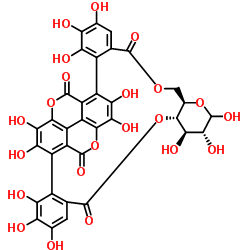Effects of punicalagin and punicalin on carrageenan-induced inflammation in rats.
C C Lin, Y F Hsu, T C Lin
Index: Am. J. Chin. Med. 27(3-4) , 371-6, (1999)
Full Text: HTML
Abstract
Punicalagin and punicalin were isolated from the leaves of Terminalia catappa L. In this study, we evaluated the anti-inflammatory activity of punicalagin and punicalin carrageenan-induced hind paw edema in rats. After evaluation of the anti-inflammatory effects, the edema rates were increased by carrageenan administration and reduced by drug treatment. After 4 hr of carrageenan administration, the best effect group was the punicalagin (10 mg/kg) treated group (inhibition rate was 58.15%), and the second was the punicalagin (5 mg/kg)-treated group (inhibition rate was 39.15%). However, even if the anti-inflammatory activity of punicalagin was the same as punicalin at the 5 mg/kg dose, the inhibition effect from larger doses of punicalagin was increased, but there was a decrease with a larger dose of punicalin. The data showed that both punicalagin and punicalin exert anti-inflammatory activity, but treatment with larger doses of punicalin may induce some cell damages.
Related Compounds
| Structure | Name/CAS No. | Molecular Formula | Articles |
|---|---|---|---|
 |
punicalin
CAS:65995-64-4 |
C34H22O22 |
|
Effects of pomegranate chemical constituents/intestinal micr...
2009-11-25 [J. Agric. Food Chem. 57(22) , 10636-44, (2009)] |
|
A new method of standartization of health-promoting pomegran...
2006-11-01 [Georgian Med. News (140) , 70-7, (2006)] |
|
Antioxidant and hepatoprotective effects of punicalagin and ...
2001-05-01 [Phytother Res. 15(3) , 206-12, (2001)] |
|
Purification, antioxidant activity and protein-precipitating...
2013-05-01 [Food Chem. 138(1) , 437-43, (2013)] |
|
Antioxidant and hepatoprotective activity of punicalagin and...
1998-07-01 [J. Pharm. Pharmacol. 50(7) , 789-94, (1998)] |